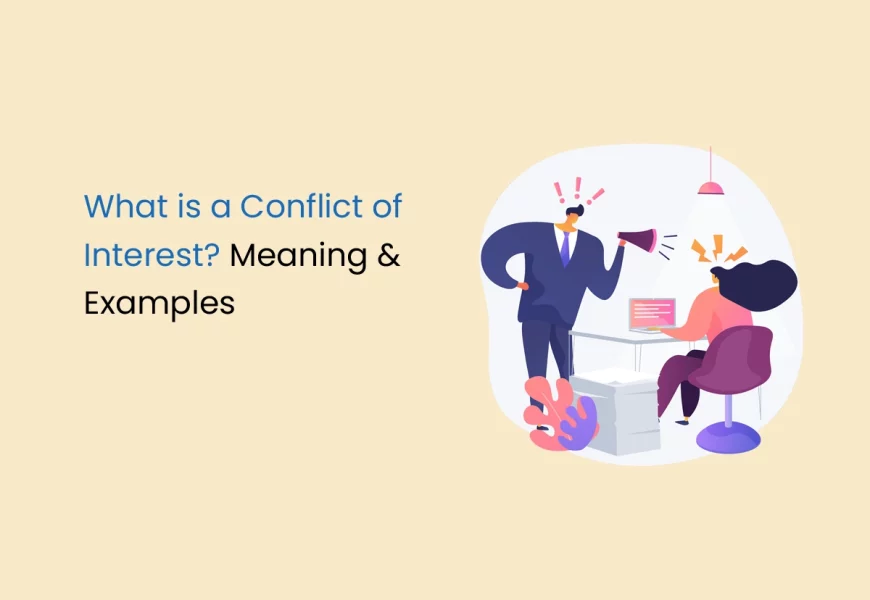Conflict of interest is a prevalent issue in the workplace, encompassing various scenarios that compromise impartiality and fairness. Whether it’s favouritism towards acquaintances, accepting gifts from potential vendors, or engaging in secondary employment during work hours, these situations can all be classified as conflicts of interest. Additionally, instances where supervisors grant special privileges, such as time off for volunteer work or allowing fundraising activities in the workplace, also contribute to conflicts of interest.
In this article, we shall be exploring more into the topic of conflict of interest in depth.
What is Conflict of Interest?
A conflict of interest arises when an individual or entity faces a dilemma between personal interests and professional obligations, leading to a compromised ability to act impartially. This conflict typically arises when there’s a vested interest, such as financial gain, personal relationships, or reputation, that may influence decision-making or judgment.
Examples of conflicts of interest include:
- Representing a family member in a legal matter, where personal ties may cloud objectivity.
- Launching a business that competes directly with one’s employer, potentially undermines loyalty and commitment.
- Recommending an investment in a company owned by a spouse raises questions about impartiality and disclosure.
- Hiring an unqualified friend or relative may prioritise personal connections over merit.
In such situations, individuals with conflicts of interest are often required, both ethically and sometimes legally, to recuse themselves from decision-making processes to uphold integrity and fairness.
What Can Be Described As Interest?
Interests encompass a broad spectrum of commitments, duties, values, and affiliations that individuals hold. These interests can range from contractual and legal obligations to personal relationships and financial considerations. Understanding the various types of interests is essential in identifying potential conflicts of interest and ensuring ethical conduct in professional and personal domains.
- Contractual or Legal Obligations: These are obligations and commitments that individuals are legally bound to uphold, such as contracts, agreements, or legal responsibilities.
- Loyalty and Relationships to Family and Friends: Personal relationships and familial ties can influence an individual’s decisions and actions, potentially creating conflicts of interest in certain situations.
- Financial Interests: Financial interests encompass monetary considerations, including investments, business ventures, ownership stakes, and financial transactions that may impact an individual’s decisions.
- Inside Knowledge: Access to privileged or confidential information can create conflicts of interest if individuals misuse or exploit such knowledge for personal gain.
- Reputation and Status: Personal reputation, social standing, and professional status may influence an individual’s actions and decisions, especially when preserving reputation becomes a priority.
- Professional Duties: Obligations and responsibilities associated with one’s profession or occupation, including adherence to professional codes of conduct and ethical standards.
- Business Interests: Involvement in business activities, partnerships, or affiliations may introduce conflicts of interest when personal interests diverge from organizational goals or values.
Categories of Individual Interests
- Direct Interests: These pertain to an individual’s own personal self-interest, familial obligations, and personal business ventures or interests.
- Indirect Interests: Indirect interests encompass the interests of individuals or groups with whom the individual associates, such as family members, close friends, or business associates.
- Financial Interests: Financial interests involve considerations of monetary value, including ownership stakes, financial investments, and commercial transactions.
- Nonfinancial Interests: Nonfinancial interests include personal relationships, familial ties, and other sources of bias that may influence an individual’s decisions or actions beyond financial considerations.
Understanding and managing these diverse interests is crucial for individuals to navigate ethical dilemmas and avoid conflicts of interest that may compromise integrity or professional conduct.
Real-World Example of Conflict of Interest
In the financial industry, the Enron scandal serves as a stark illustration of the devastating consequences of conflicts of interest and agency problems. Enron Corporation, once esteemed as one of the largest companies in the United States, collapsed in 2001 due to widespread financial misconduct orchestrated by its top executives.
At the heart of the scandal was a systemic failure to uphold fiduciary duties and act in the best interests of shareholders. Enron executives, entrusted with safeguarding shareholder value, instead prioritized personal gain and engaged in fraudulent practices to artificially inflate the company’s financial performance.
Central to the deception was using deceptive accounting techniques, notably mark-to-market accounting and special purpose vehicles (SPVs), to conceal substantial losses and debts from investors and regulators. By misrepresenting the company’s financial health, executives sought to maintain inflated stock prices and secure lucrative bonuses tied to performance metrics.
However, these actions ultimately proved unsustainable, leading to Enron’s spectacular downfall and eventual bankruptcy. The revelation of widespread financial misconduct shattered investor confidence, causing Enron’s stock prices to plummet from over $90 per share to less than $1 per share.
The Enron scandal underscored the grave repercussions of unchecked conflicts of interest and the failure of corporate governance mechanisms to hold executives accountable for their actions. Several Enron executives faced criminal charges and were convicted for their roles in perpetrating one of the most notorious corporate frauds in history.
This real-world example serves as a cautionary tale, highlighting the imperative of robust regulatory oversight, ethical leadership, and transparency in mitigating conflicts of interest and ensuring the integrity and stability of financial markets.
Common Types of Conflicts of Interest
Self-dealing is a prevalent form of conflict of interest observed in the business realm. It occurs when a management-level professional engages in transactions that benefit themselves but harm the company or its clients. For instance, a company executive might approve a contract with a vendor in exchange for personal kickbacks, prioritising personal gain over the organisation’s best interests.
Gift issuance represents another common conflict of interest scenario, typically arising when corporate managers accept gifts from clients or similar individuals. This practice can influence decision-making and create perceptions of favouritism or bias in business dealings. For example, a company executive receiving expensive gifts from a supplier may compromise their impartiality in future transactions.
Misuse of confidential information is a serious ethical breach wherein individuals exploit confidential data obtained during professional duties for personal gain. This violation erodes trust and integrity within organisations and can lead to legal consequences. An employee sharing sensitive client information with a competitor for financial compensation is an example of this type of conflict of interest.
Nepotism involves favouritism shown towards relatives or spouses in hiring or workplace treatment, often at the expense of merit-based decisions. This practice undermines fairness and equality in the workplace and can foster resentment among other employees. For instance, a manager promoting their unqualified relative over more deserving candidates can damage morale and employee trust.
Financial advisor conflicts are prevalent in industries like finance, where advisors may prioritise personal gain over client interests. This conflict arises when advisors recommend products or services that benefit them financially but may not be suitable for their clients. Such behaviour violates fiduciary duties and erodes trust in financial institutions. For instance, recommending high-commission investment products that are unsuitable or risky for clients constitutes a conflict of interest in the financial advisory sector.
These various types of conflicts of interest pose significant ethical challenges in business and professional settings. Identifying and addressing these conflicts is crucial for upholding integrity, trust, and ethical standards within organisations and ensuring fair and transparent decision-making processes.
Tips for Avoiding a Conflict of Interest
Navigating potential conflicts of interest in your professional life requires diligence, transparency, and ethical awareness. Here are some practical tips to help you avoid such situations:
- Know Your Company’s Policies: Familiarize yourself with your company’s policies regarding conflicts of interest, including any non-compete agreements or guidelines related to external engagements. Adhering to these policies helps mitigate the risk of conflicting loyalties.
- Ensure Transparency: Maintain transparency in your actions, especially when handling funds or collaborating with external parties. Document your decisions and communications clearly to provide transparency and mitigate any perception of impropriety.
- Remove Yourself from Conflicting Situations: If you find yourself in a situation where your interests conflict with your professional responsibilities, consider recusing yourself from the decision-making process. Discuss the conflict with your supervisor or relevant stakeholders and explore options for removing yourself from the situation to maintain integrity.
- Exercise Discretion in Accepting Assignments: Be discerning when considering new positions or assignments that could potentially lead to conflicts of interest. If a role presents a conflict with your existing obligations or loyalties, it may be necessary to decline the opportunity to avoid compromising your integrity.
- Disclose Relevant Connections: When taking on roles or responsibilities that have the potential for conflicts of interest, proactively disclose any relevant connections, affiliations, or loyalties to all involved parties. Open communication and transparency facilitate informed decision-making and help prevent misunderstandings or suspicions of bias.
Following these guidelines and remaining vigilant about potential conflicts of interest can aid you in upholding ethical standards, maintaining trust in professional relationships, and safeguarding your reputation and integrity.
Risks and Consequences of Conflict of Interest
A conflict of interest, while not inherently illegal, can have significant legal, financial, and reputational consequences. Here are some key risks and potential repercussions associated with conflicts of interest:
Legal Issues
Conflicts of interest can lead to legal consequences, especially if they involve breaches of contract or unethical activities. For instance, employees who violate non-compete agreements by freelancing for competitors may face legal action from their employers for breaching their employment contracts. Similarly, individuals who engage in unethical practices, such as using insider information for personal gain, may be subject to lawsuits or legal penalties.
Financial Losses
One of the most common repercussions of conflicts of interest is financial loss. When employees prioritise personal interests over their professional obligations, it can result in reduced productivity, missed business opportunities, or breaches of contractual agreements, leading to financial losses for both individuals and organisations. Additionally, businesses that engage in unethical behaviour may suffer financial repercussions due to damaged relationships with partners, suppliers, or customers.
Damaged Reputation
Conflicts of interest can tarnish a company’s reputation, which is often built over years of investment in brand identity and trust-building efforts. Engaging in unethical behaviour can erode consumer confidence, leading to a loss of business opportunities and long-term damage to the company’s image. A damaged reputation can have far-reaching consequences, affecting relationships with customers, employees, stakeholders, and partners.
Loss of Trust
A significant consequence of conflicts of interest is the loss of trust among stakeholders, including employees, customers, and partners. When individuals or organisations prioritise personal gain over ethical conduct, it undermines trust and credibility, leading to disillusionment and scepticism among those affected. Loss of trust can have profound implications for employee morale, customer loyalty, and overall organisational integrity.
Conflicts of interest pose serious risks to individuals and organisations, ranging from legal liabilities and financial losses to reputational damage and loss of trust. Mitigating these risks requires proactive measures, including clear policies, transparent communication, and ethical decision-making, to uphold integrity and maintain trust in professional relationships.
FAQs on Conflict of Interest
What Are the Three Types of Conflict of Interest?
The three main types of conflict of interest are:
- Financial Conflict of Interest: Involves situations where individuals or entities stand to gain financially from their decisions or actions, potentially influencing their behaviour or decision-making process.
- Personal Conflict of Interest: Arises when individuals' personal interests, relationships, or affiliations conflict with their professional responsibilities or duties, leading to biased or compromised decision-making.
- Professional Conflict of Interest: This occurs when individuals face conflicting obligations or loyalties within their professional roles, such as serving multiple clients with competing interests or holding positions with conflicting responsibilities.
What is Another Word for Conflict of Interest?
Another word for conflict of interest is "undue influence," "existing allegiances," "competition of interest," or "loyalty conflict." These terms describe situations where individuals or entities may be influenced by conflicting interests or loyalties, potentially compromising their impartiality, objectivity, or ethical integrity.














